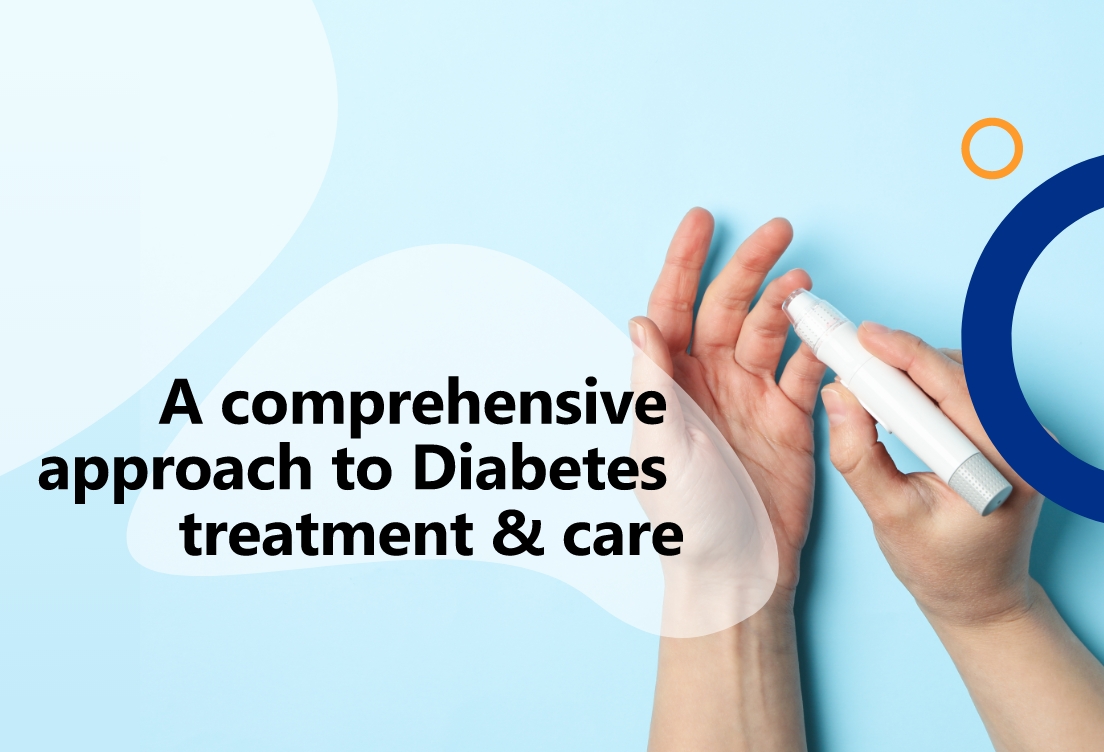Diabetes Care at LEON
It is common to feel overwhelmed, sad or even angry when you are living with Diabetes. Leon Medical Centers can help you obtain better control of your Diabetes. We are here to give you the support you need to take better care of yourself by helping you learn how to eat healthier, be more active and take the right medications to lower your sugar if needed. Whether you have been just diagnosed, are caring for a loved one, or have been dealing with Type 1 or Type 2 Diabetes for some time, the path to understanding Diabetes starts here. Together, we can assist you to reduce your risk of complications due to Diabetes and help you live a longer and healthier lives.
Leon Medical Centers provides a personalized, comprehensive approach to Diabetes treatment and care. Primary physicians, endocrinologists, nutritionists, educators, trainers, ophthalmologists, podiatrists, work in coordination to build a personalized plan according to your condition and needs so that you may manage your Diabetes in the best way possible.
What is Diabetes?
Diabetes mellitus (DM), commonly referred to as Diabetes, is a group of metabolic disorders in which there are high blood sugar levels over a prolonged period. There is Diabetes type 1 and Diabetes Type 2.
Diabetes Type 1
- Normally less than 30 years of age
- Produce very little or no insulin
- Damaged or destroyed beta cells
- Autoimmune disorder
Symptoms
- Increased thirst
- Frequent urination
- Feeling tired
- Weight loss
- Increase in appetite
- Blurry vision
- Nausea/vomiting
Treatment
- Healthy eating
- Physical activity
- Monitoring blood glucose
- Start insulin therapy
Risk Factors
- None
Diabetes Type 2
- Normally after 40 years of age
- The body does not use insulin correctly
- The body does not produce enough insulin
Symptoms
- Tiredness and/or Irritability
- Frequent infections and/or lengthy healing
- Blurry vision
- Numbness and tingling in feet and hands
- Weight changes
- Increased thirst
- Frequent urination
- Dry skin
Treatment
- Healthy eating
- Physical activity
- Monitoring blood glucose
- Oral medications or insulin
Risk Factors
- Age over 45 years
- Overweight
- Family history
- HDL Cholesterol less than 35
- Hight triglyceride level
- High Blood pressure
- Pre-diabetes
- Sedentary lifestyle
- Race
Suggestions for staying active
Exercising regularly is important for your overall health, especially when you have Diabetes. Exercising is not only about losing weight. It has many other health benefits, such as increasing muscle strength and bone density and reducing body fat and stress. This leads to improved fitness, flexibility, and endurance, all of which result in better overall health.
At Leon Medical Centers, our certified physical trainers can help you make a plan for the type and frequency of exercise (activity plan) that works for you.
Make sure that you:
- Do at least 150 minutes of moderate-intensity or vigorous-intensity exercise each week. This could be brisk walking, biking, or water aerobics.
- Do stretching and strength exercises, such as yoga or weightlifting, at least 2 times a week.
- Spread out your activity over at least 3 days of the week.
- Get some form of physical activity every day.
- Do not go more than 2 days in a row without some kind of physical activity.
- Avoid being inactive for more than 30 minutes at a time. Take frequent breaks to walk or stretch.
- Choose a type of exercise or activity that you enjoy and set realistic goals.
- Start slowly, and gradually increase the intensity of your exercise over time.
Nutritional Tips
Individual meal plans, portion control and balanced meals are key to assist you in controlling your diabetes and improve your overall health. Focus on including healthy grains, complex carbohydrates, lean protein and healthy fats into your daily meal plan to help you control your blood sugar (glucose). Making healthy meal choices can help in improving your overall health.
SERVING SIZES
Measuring foods and serving sizes helps to make sure you are getting the right amount of food. The list below tells how big or small some common serving sizes are:
- 1 oz………4 stacked dice
- 3 oz………Deck of cards
- 1 tsp……..Tip of little finger
- 1 tbs……..Thumb
- 2 tbs……..Golf ball
- 1⁄2 cup…….Half of a fist
- 1 cup……..A fist
GUIDELINES FOR CHOOSING FOODS
The goal of healthy nutrition is to eat a variety of foods while limiting the amount of carbohydrates each day. This can be done by choosing foods that are low in calories and fat. Eat 3 main balanced meals per day, breakfast, lunch and dinner. Doing this helps control your blood glucose levels so they do not get too high or too low. Each meal or snack may include a lean protein food source to help you feel more satisfied and to stabilize your blood glucose. Try to eat about the same amount of food around the same time each day. This includes weekend days, travel days, and days off work. If your meals are more than 5 hours apart you can add a healthy snack if you wish.
Healthy meals and snacks include whole grains, vegetables, fruits, lean meats, poultry, fish, and dairy products. As you plan your meals, select a variety of foods. Choose from the bread and starch, vegetable, fruit, dairy, and meat/protein groups.
Frequently Asked Questions
When you have type 2 diabetes, you first need to have a healthy meal plan, stay physically active and lose any extra weight. If these lifestyle changes cannot control your blood sugar, you also may need to take pills and other injected medication, including insulin.
Having a healthy meal plan, being physically active, and losing any extra weight is the first line of therapy. “Healthy meal plan and exercise“ is the foundation of all diabetes management because it makes your body’s cells respond better to insulin (in other words, it decreases insulin resistance) and lowers blood sugar levels.
Small changes in your healthy meal plan and exercise can make a big difference with pre-diabetes. Assess your risk and change your course today.
Exercise is beneficial in the management of type 2 diabetes. Always consult with your doctor about exercise guidelines, to exercise safely and reduce risks.
You may feel fine, but that is no guarantee that your blood sugar levels are in the target range. Remember, diabetic complications do not appear right away. And complications may develop even when the blood sugar is only slightly elevated. Regular blood sugar monitoring can help you keep your blood sugars in control and prevent serious damage to your eyes, kidneys and nerves. If your sugar levels are out of line, consult your doctor.
Yes. Type 2 diabetes is a genetic disease. The risk is highest when multiple family members have diabetes, and if the children also are overweight, sedentary and have the other risk factors for type 2 diabetes. Your child has a 10-15% chance of developing type 2 diabetes when you have type 2 diabetes. And if one identical twin has type 2 diabetes, there is a 75% likelihood of the other twin developing type 2 diabetes also.
Although we cannot change your genetic risk for developing type 2 diabetes, we do know that even modest exercise and weight loss can delay or prevent the development of type 2 diabetes. A landmark research study in the United States, the Diabetes Prevention Program (DPP) was completed in 2002 and showed that when people modified their risk factors for type 2 diabetes, they prevent their chance of developing the condition.
There are 4 main test that can be done for diagnosis
- Fasting blood glucose levels equal or over 126mg/dL on 2 different occasions
- Blood glucose levels equal or over 200mg/dL with symptoms of diabetes
- Two hours post glucose tolerance test levels equal or over 200mg/dL
- Hemoglobin A1c greater than 6.5%
If you are asymptomatic you will need 2 different tests from the ones aforementioned.



